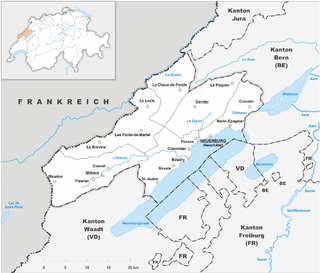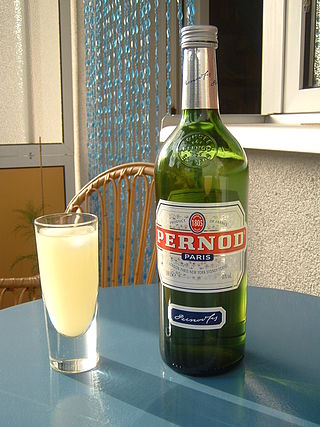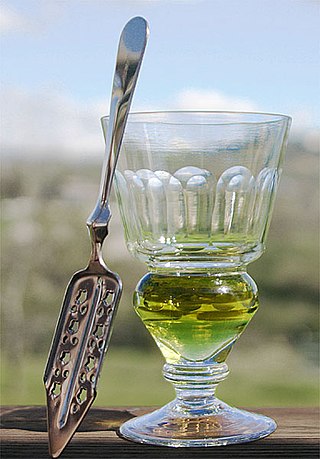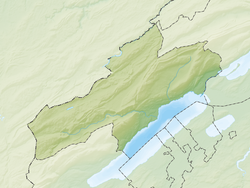
The Republic and Canton of Neuchâtel is a mostly French-speaking canton in western Switzerland. In 2007, its population was 169,782, of whom 39,654 were foreigners. The capital is Neuchâtel.

Pernod is an absinthe produced by Pernod Ricard released in 2005 based on the original Pernod Fils recipe.

Districts of Switzerland are a political subdivision for cantons. In the federally constituted Switzerland, each canton is completely free to decide its own internal organisation. Therefore, there exists a variety of structures and terminology for the subnational entities between canton and municipality, loosely termed districts. Most cantons are divided into Bezirke. They are also termed Ämter, Amtsbezirke, district or distretto. The Bezirke generally provide only administration and court organization. However, for historical reasons districts in cantons Graubünden and Schwyz are their own legal entities with jurisdiction over tax and often have their own Landsgemeinde.
La Fée Absinthe is a brand of absinthe, a highly alcoholic, distilled spirit containing the herb wormwood. La Fée Absinthe was created by Green Utopia, which is owned and run by George Rowley.
Val-de-Travers District was one of the six districts of the canton of Neuchâtel, Switzerland, until the district level was eliminated on 1 January 2018. It is famous for its clock industry. The Canton is largely rural and farming remains important, but it also had significant industry from the 17th century due to the hydro-power available at St Sulpice, and Asphalt was mined from 1711 to 1986 at Travers.
Boveresse was a municipality in the district of Val-de-Travers in the canton of Neuchâtel in Switzerland. On 1 January 2009, the former municipalities of Boveresse, Buttes, Couvet, Fleurier, Les Bayards, Môtiers, Noiraigue, Saint-Sulpice and Travers merged to form Val-de-Travers.

Buttes was a municipality in the district of Val-de-Travers in the canton of Neuchâtel in Switzerland. On 1 January 2009, the former municipalities of Boveresse, Buttes, Couvet, Fleurier, Les Bayards, Môtiers, Noiraigue, Saint-Sulpice and Travers merged to form Val-de-Travers.

Val-de-Travers is a municipality in the canton of Neuchâtel in Switzerland. It was created on 1 January 2009, when the former municipalities of Boveresse, Buttes, Couvet, Fleurier, Les Bayards, Môtiers, Noiraigue, Saint-Sulpice and Travers merged to form Val-de-Travers.

Fleurier was a municipality in the district of Val-de-Travers in the canton of Neuchâtel in Switzerland. On 1 January 2009, the former municipalities of Boveresse, Buttes, Couvet, Fleurier, Les Bayards, Môtiers, Noiraigue, Saint-Sulpice and Travers merged to form the administrative district of Val-de-Travers.

Les Bayards was a municipality in the district of Val-de-Travers in the canton of Neuchâtel in Switzerland. On 1 January 2009, the former municipalities of Boveresse, Buttes, Couvet, Fleurier, Les Bayards, Môtiers, Noiraigue, Saint-Sulpice and Travers merged to form Val-de-Travers.

Môtiers was a municipality in the district of Val-de-Travers in the canton of Neuchâtel in Switzerland. On 1 January 2009, the former municipalities of Boveresse, Buttes, Couvet, Fleurier, Les Bayards, Môtiers, Noiraigue, Saint-Sulpice and Travers merged to form the administrative district of Val-de-Travers.

Noiraigue or Noiraigue-Les Œillons was a municipality in the district of Val-de-Travers in the canton of Neuchâtel in Switzerland. On 1 January 2009, the former municipalities of Boveresse, Buttes, Couvet, Fleurier, Les Bayards, Môtiers, Noiraigue, Saint-Sulpice and Travers merged to form Val-de-Travers.
Saint-Sulpice was a municipality in the district of Val-de-Travers in the canton of Neuchâtel in Switzerland. On 1 January 2009, the former municipalities of Boveresse, Buttes, Couvet, Fleurier, Les Bayards, Môtiers, Noiraigue, Saint-Sulpice and Travers merged to form Val-de-Travers.

Travers was a municipality in the district of Val-de-Travers in the canton of Neuchâtel in Switzerland. On 1 January 2009, the former municipalities of Boveresse, Buttes, Couvet, Fleurier, Les Bayards, Môtiers, Noiraigue, Saint-Sulpice and Travers merged to form Val-de-Travers.
La Clandestine Absinthe is a Swiss La Bleue, or clear, absinthe brand produced by Artemisia-Bugnon distilleries. It is an anise-flavored, distilled liquor containing the herb wormwood, and when prepared with cold water will louche. La Clandestine Absinthe comes in four main styles, as detailed below.

Absinthe is an anise-flavored spirit derived from several plants, including the flowers and leaves of Artemisia absinthium, together with green anise, sweet fennel, and other medicinal and culinary herbs. Historically described as a highly alcoholic spirit, it is 45–74% ABV or 90–148 proof in the US. Absinthe traditionally has a natural green color but may also be colorless. It is commonly referred to in historical literature as la fée verte. While sometimes casually referred to as a liqueur, absinthe is not traditionally bottled with sugar or sweeteners. Absinthe is traditionally bottled at a high level of alcohol by volume, but it is normally diluted with water before being consumed.
Kübler Absinthe Superieure is a brand of absinthe, distilled in the Val-de-Travers region of Switzerland also known as the "birthplace of absinthe". Kübler Absinthe was first produced in 1863 and was the first brand to be sold legally in Switzerland after the national ban on absinthe was lifted in March, 2005. The legalization of absinthe in Switzerland is largely due to Kübler's lobbying efforts. The United States Alcohol and Tobacco Tax and Trade Bureau (TTB) approved the formula for Kübler Absinthe in 2004, and approved the product for sale in the United States in May 2007 after three years of discussions among Kübler, Food and Drug Administration, TTB, and U.S. Customs and Border Protection. These discussions proved to be instrumental in opening the door for many brands of absinthe to be legally sold or produced in the United States.

The Creux du Van is a natural rocky cirque approximately 1,400 metres wide and 150 metres deep, on the north side of Le Soliat, in the Val de Travers district in the Swiss canton of Neuchâtel. A very well known, amphitheatre-shaped natural attraction, it is at the heart of a nature reservation area of 15.5 km2.

Edouard Dubied & Cie S.A. was a Swiss enterprise producing machines for the textile industry. It was formed in 1867 and closed in 1987. It was based in Neuchâtel and then in Couvet.

The Neuchâtel–Pontarlier railway, also known as the Val-de-Travers line or the Franco-Suisse (Franco-Swiss) line, is a single-track standard-gauge railway line run by the Swiss Federal Railways (SBB) and the French public railway infrastructure company Réseau ferré de France (RFF).


















